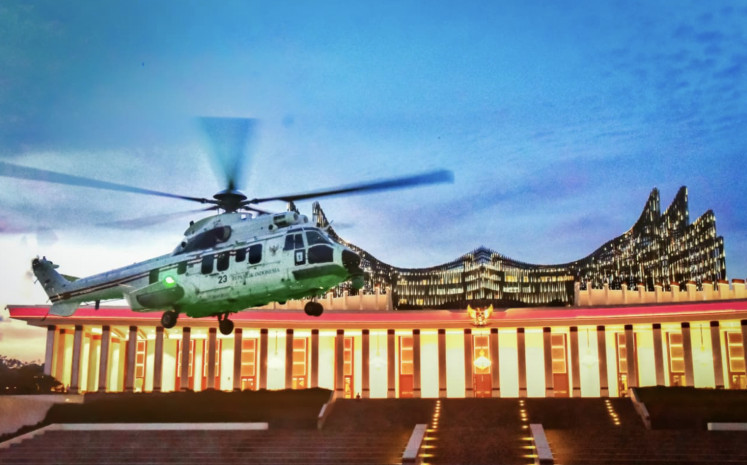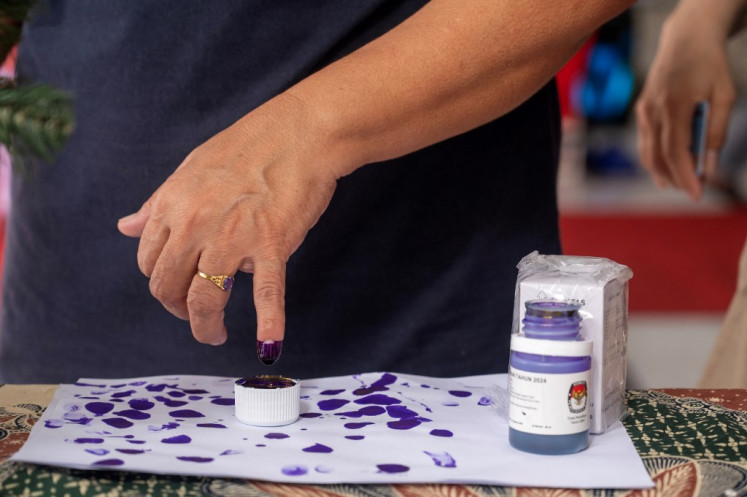Popular Reads
Top Results
Can't find what you're looking for?
View all search resultsPopular Reads
Top Results
Can't find what you're looking for?
View all search resultsSolomon Islands ‘rebellion’ against Australia may happen in Papua
Gus Dur will be always remembered by Papuans as a president who wholeheartedly tried to restore the full dignity of the Papuan people.
Change text size
Gift Premium Articles
to Anyone
I
ndonesian policymakers, from the highest to the lowest rung ladder, need to read and discuss with open minds an article that appeared in The Conversation titled “Despite its Pacific ‘step-up’, Australia is still not listening to the region, new research shows”. Published on Feb. 12, 2020, the article was based on the outcome of policy research by Western Sydney University.
The research aimed to understand the perception of the people of the Solomon Islands, Fiji and Vanuatu about Australia. The in-depth survey helps explain the decision of the Solomon Islands to sign a security pact with China because Australia treats smaller neighbors in the Pacific as “colonies” and demands their absolute loyalty in exchange for economic aid it has poured abundantly on them. They have to follow what Australia wants.
The decision to go to China is likely just “the tip of the iceberg”. Doesn’t it sound like what is going on now in Papua, where aspirations for freedom from Jakarta have been long heard?
The sentiment of the respondents in the research will likely be shared by Papuans, who have a strong background and ethnic bond with people in the Pacific. The way Australia behaves is not very different from Jakarta's attitude toward the Papuan people.
I would suggest that Foreign Minister Retno LP Marsudi invite the Western Sydney University team to present their findings to President Joko “Jokowi” Widodo and his Cabinet, then invite a group of Papuan representatives to speak about what’s on their minds with the President after the presentation.
I am pretty sure the views of the people in the tiny Pacific nations about Australia and the feeling of the Papuan people toward Indonesia will be similar.
The House of Representatives just approved an initiative bill on the establishment of three new provinces in Papua to be tabled for deliberation with the government. The House previously passed a revision of the 2001 Papua Special Autonomy Law that allows the central government to regain its dominant role in Papua, including with regard to the use of the province's huge special autonomy funds.
The amended law abolishes the central government's obligation to get prior approval from the Papuan People’s Assembly (MRP) and the provincial legislative councils (DPRP) in creating new provinces, cities and regencies. It provoked a furor among Papuan leaders but the protests went unheeded.
The new provinces will be named South Papua, which will cover Merauke, Mappi, Asmat and Boven Digoel regencies; Central Papua, to consist of the regencies of Nabire, Mimika, Paniai, Dogiyai, Deiyai, Intan Jaya, Puncak Jaya and Puncak; and Papua Central Highlands, comprising Jayawijaya, Lanny Jaya, Central Mamberamo, Nduga, Tolikara, Yahukimo and Yalimo regencies.
The Jakarta Post’s editorial on April 22 pointed out that “the real motive behind this ‘divide and rule’ act will sooner or later unfold, but surely the objective to form South Papua, Central Papua and Papua Central Highlands provinces go beyond political and security interests. There must be economic interests at stake because Papua is rich in natural resources that range from minerals to forestry”.
As a sweetener, the government will increase the special autonomy funds from 2 percent to 2.25 percent of the general allocation fund, with a particular focus on health and education. The Finance Ministry estimates that over the next 20 years, the Papuan provinces will receive Rp 234.6 trillion (US$16 billion), but with stricter accountability requirements.
The people in the three Pacific nations perceive Australia as knowing nothing about how to engage successfully as part of the Pacific community. This also applies to the case of Papua.
“As a Pacific islander, these are our countries, this is our place. Whatever countries want to do to help us should be beneficial for us but also create relationships. That is what our culture is all about: creating lasting relationships, not just to fulfill their agendas and leave us,” a respondent said.
The same answer will likely come from Papuans.
The Australians overemphasized the importance of the quantity of their economic aid or trade because a major portion of the so-called aid returned to Australia.
“There was also a perception of a certain level of racism and disrespect directed toward people from the Pacific,” the report concluded.
Australia and the United States are outraged by the recent decision of the Solomon Islands to sign a security pact with China. Daniel Kritenbrink, the assistant secretary of state for East Asian and Pacific affairs, said the US would not hesitate to take military actions when Beijing is allowed to build a military base in the Solomon Islands.
Indonesia's response to the Papuans wanting an independence referendum was not much different. The government continuously uses the same threat to silence such demands.
The Solomon Islands is an independent nation, while Papua is an integral part of Indonesia. But many in Papua feel like second-class citizens in the archipelago.
On Dec. 30, 1999, then-president Abdurrahman “Gus Dur” Wahid visited Jayapura. He surprisingly announced the change of name of Irian Jaya province to Papua, a long taboo during Soeharto’s 32-year dictatorship. Gus Dur also allowed Papuans to raise the Morning Star flag as long as it was hoisted together with and lower than the national red-and-white flag.
Gus Dur will be always remembered by Papuans as a president who wholeheartedly tried to restore the full dignity of the Papuan people. Other leaders just treated the people who live in the country’s easternmost territory as ungrateful citizens.
Indonesia must learn from the decision of the Solomon Islands to punish Australia and the US with a security agreement with China. One day, the Papuan people will also want to punish Indonesia with an equally severe sentence if Jakarta continues to treat them merely as objects instead of the subjects of development.
***
The writer is a senior editor at The Jakarta Post.










